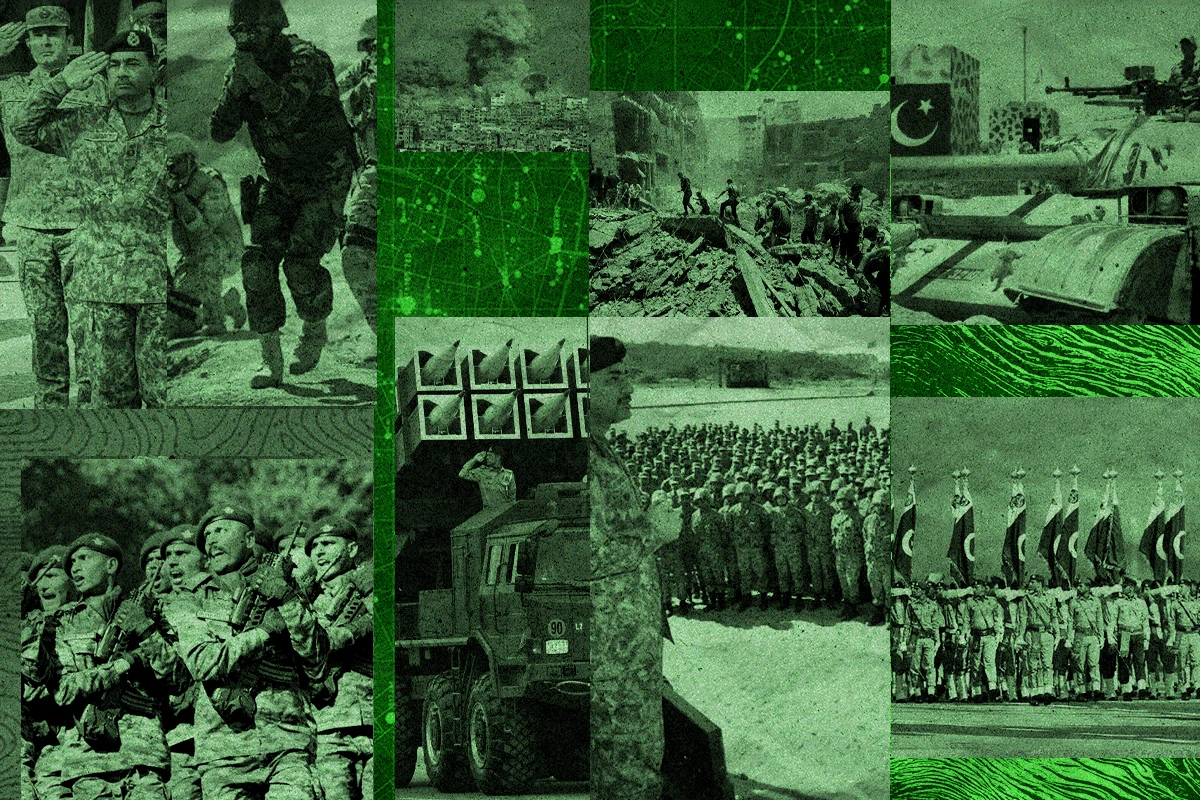This is Part Two of a two-part feature examining how Gaza and Zionism expose the deeper structural contradictions of the Western-led order.
Part 1, can be read here.
If you think Pakistan can’t do anything for Gaza, think again. But understand the rules of the game first.
Let’s start with facts: No other Muslim military has the sheer kinetic capability and doctrinal structure to challenge Israel’s siege on Gaza like Pakistan’s armed forces. That’s not bluster; it’s a cold military reality. But capability isn’t the same as viability.
Pakistan cannot take the Iran route –– not because it lacks courage or weapons, but because it lacks strategic insulation. Iran survives its anti-Zionist posture because of a unique mix: geographic depth, ideological coherence, proxy ecosystems, and a wartime economy hardened over decades. Pakistan has none of those luxuries.
If Islamabad postures harder than Ankara, Riyadh, Abu Dhabi, or Doha, it risks becoming more Catholic than the Pope — isolated from the very bloc that underwrites its military ambitions, economy and expat labour force. The result? Economic collapse, internal instability, and eventually, civil war. And in that chaos, the very forces Pakistan’s establishment spent 20 years suppressing will rise again with structure — this time over a total collapse of the social fabric.
Ask yourself: Who wins if Pakistan burns from within? It’s not the West. And it’s definitely not Gaza.
Yet, Pakistan stands at a unique junction. Unlike Arab states, it has no peace with Israel. Unlike Iran, it has no ideological blockade against the West. But unlike both, it has a deep-rooted, cross-ideological consensus on Palestine — spanning religious parties, secular progressives, and military circles.
Pakistan cannot and should not aim to “solve” Gaza. But it retains the capacity to disrupt the default. Its military strength, public moral consensus, and geopolitical detachment from Arab servility allow it to act without collapsing. But only if it acts structurally, not emotionally. Pakistan’s real role is to break the paralysis.
What Pakistan needs is not war posturing, but covert and institutional structuring without repeating the mistakes of IRGC:
- Align with states outside the Western consensus who are structurally willing to act — South Africa, Colombia, Brazil, Ireland, Turkiye, Malaysia, Indonesia, and others.
- Transfer technologies to the resistance without state signature, not slogans;
- Restore strategic ambiguity to the region by signalling, not announcing, support structures for asymmetric resistance: intelligence flow, cyber logistics, ISR data.
- Back flotillas to Gaza with coalitions — Ireland, Brazil, South Africa, Turkiye, Malaysia, and others.
- Use its diplomatic and legal capital to undermine Israeli legitimacy in multilateral forums.
- Keep Israel structurally occupied at home, not just morally embarrassed abroad.
- Keep strategic pressure around Israel in the footsteps of Turkiye – focusing on Syrian, Iraqi, and Libyan defence needs.
Israel fears capability. Not intent. That’s where Pakistan must focus.
The bottomline is to break the default: Zionism thrives in the absence of coordinated action. Coordination is the kill switch. Pakistan’s historical role in global conflicts has often been as a spoiler, accelerator, or enabler. That is where it adds value – as a trigger point in a crumbling system, not as a saviour.
It must also do what Israel already does: prepare for long-term confrontation with adversaries that may not be threats today, but will be. That means mapping Israel’s military doctrines, cyber architectures, diaspora influence, and intelligence posture.
Pakistan must begin to see Israel as Israel sees Pakistan: a future adversary whose potential must be tracked, even if that potential is only 2 percent today.
This demands a shift in security culture — from reactive posture to anticipatory doctrine. Palestine must no longer be treated as an episodic emotional cause, but as a forward theatre where Pakistani power will inevitably be tested. As Pakistan’s defence and economic vectors expand into the Turkic sphere, the Gulf, the Levant, Africa, Latin America, and the Maghreb, they will collide with entrenched Israeli–Western interests. That collision will not be symbolic; it will unfold across procurement networks, defence needs, and strategic narratives. The arms market of that scale remains uncharted territory for Pakistan — and even for China — but entering it is no longer optional.
Strategic Tasks for the Islamic World
The Muslim world does not face defeat due to lack of population, technology, weapons, or money. It faces paralysis because it exists within an order designed to ensure incoherence. The broader Islamic world suffers from disunity by design: the Westphalian logic punishes coherence and, therefore, the Zionist project survives by default. These have been the scaffolds of the League of Nations, the United Nations, and the “rules-based order” which, in theory, promised dignity to all peoples.
For Muslims, however, these rules have always been a cage – a system that criminalises civilisational memory, disarms the core of its identity that forges a transnational reality, and legalises colonial remnants like Zionism while punishing any resistance to it.
There is no Muslim deterrence doctrine. No Islamic joint command structure. No planning for strategic depth. Power exists in silos: Turkiye’s military-industrial autonomy, Iran’s asymmetric web, Pakistan’s nuclear and intelligence edge. None of these connect to a shared framework, organic or otherwise. Zionism thrives not because of inherent strength, but because the field is void of adversarial organisation.
This incoherence, again, is not accidental. It is the obvious outcome of legal, financial, and institutional architecture that punishes deviation from Western security norms. Even when Muslim regimes coordinate — whether through the OIC or the Arab League, under US oversight — they operate within frameworks that actively disallow offensive posturing or narrative disruption.
Hence the permanent anxiety: the moral instincts of Muslim publics are real, but the structural pathways to translate those instincts into strategic outcomes do not exist. Pakistan’s dilemma is emblematic: a population that sees Gaza as a red line, and a state that knows action invites economic collapse, diplomatic isolation, or internal destabilisation.
But Gaza has triggered a tectonic shift in public perception. State structures may remain paralysed, but civilisational memory is reactivating.
What must follow is not emotionalism, but system-building:
- Form quiet coalitions (Turkiye, Malaysia, Indonesia, Algeria, Pakistan, South Africa),
- Initiate military planning cells — not for immediate offensive action, but for future interoperability,
- Develop legal, financial, and information infrastructures outside Western gatekeeping.
Israel’s strength is not the arms, but in controlling the frameworks of legitimacy. That’s where it must be weakened first.
Final Thought: The Arc is Civilisational, Not Regional
The West may be a spent civilisation, Zionism a settler-colonial relic, America a hegemon in strategic exhaustion — yet none of this will translate into Palestinian liberation without broader Muslim action and sustained military pressure on the ground by Palestinians themselves. If the Red Army could endure extremely high kill ratios in its major battles until 1942–43 before overwhelming Nazi Germany, , then Gaza can sustain such attrition levels — or worse. Gazans have already demonstrated the effectiveness of their far greater grit and the martial discipline of their faith; alone, they can pin Israel down. The Zionist project will collapse only when the cost of sustaining it becomes unbearable for the West — and only Palestinians, particularly Gazans, can meaningfully raise that cost.
In this light, what we are witnessing is not a regional conflict but the slow disintegration of a civilisational order. Toynbee warned that it is not outright defeat that collapses dominant powers, but their inability to respond with creative adaptation. The West is now creatively exhausted. Zionism is its brittle periphery — and Gaza may be the moment when the periphery fractures the core.
For the Muslim world — and for Pakistan in particular — the choice is not between war and surrender. It is between remaining within a decaying system that forbids coherent action, or taking the risks necessary to build a parallel logic of power. That requires initiative, not reaction. The first actors to move will carry the burden of realignment, not the burden of war.
The Muslim world has enough precedents to challenge its prevailing dismay — precedents that point back toward risk management rather than risk aversion. From the Dardanelles to Bosnia, Muslim nations have often feared their own successes. They could not institutionalise their gains the way America did after the First Barbary War of 1801.
In this frame, Gaza is not an orphaned cause for Pakistan, but a pressure point where new legitimacy can be forged — legal, strategic, and civilisational.
If Pakistan holds any genuine long-term strategic ambition for a trillion-dollar economy, it must recognise this moment as the one to align its structures with the world that will emerge after. History remembers those who move with structure when the system begins to fall.
The views expressed in this article are the author’s own. They do not necessarily reflect the editorial policy of the South Asia Times.



![Ukrainian and Russian flags with soldier silhouettes representing ongoing conflict. [Image via Atlantic Council].](https://southasiatimes.org/wp-content/uploads/2026/02/2022-02-09T000000Z_1319661209_MT1NURPHO000HXCNME_RTRMADP_3_UKRAINE-CONFLICT-STOCK-PICTURES-scaled-e1661353077377.jpg)



![Truck traveling along the Makran Coastal Highway in Balochistan, with rugged cliffs and the Arabian Sea coastline in the background [Image via Getty Images].](https://southasiatimes.org/wp-content/uploads/2026/02/Balochistan-2.webp)